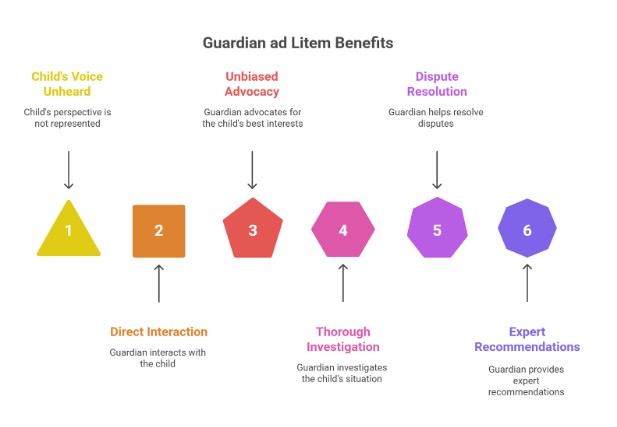Why Have a Guardian ad Litem in a Family Law Case? Protecting Children’s Best Interests

A Guardian ad Litem (GAL) is a court-appointed advocate who investigates and reports on a child’s best interests.
Florida Statute 61.403 outlines the powers and authority that the Court can give to an appointed Guardian Ad Litem (GAL).
Family courts regularly appoint GALs to represent the best interests of minor children in a case. Oftentimes, those appointed representatives are attorneys, but it is not required.
A Guardian ad Litem can step in to help protect children during these stressful times.
A Guardian ad Litem is a neutral person the court appoints to investigate and speak up for what’s truly best for the child in Florida family law cases.
This person basically becomes the eyes and ears of the judge when parents can’t agree on custody or when there are worries about a child’s safety.
Usually, Guardians ad Litem are attorneys or trained advocates with no ties to either parent. The appointment of a Guardian ad Litem can dramatically impact the outcome of a family law case.
They investigate, interview all parties involved, and provide recommendations to assist judges in making informed decisions. This process helps keep the focus on the kids, even when parents can’t see eye-to-eye.
Key Takeaways
- A Guardian ad Litem is a court-appointed neutral advocate who investigates and represents the best interests of children in family law cases.
- Judges typically appoint a Guardian ad Litem when parents disagree about custody, there are abuse allegations, or the case involves high-conflict situations.
- The Guardian ad Litem conducts interviews, home visits, and reviews records before making recommendations that can significantly influence the court’s final decision.
What is a Guardian ad Litem in Florida?

Under Florida Statute §61.403, a Guardian ad Litem is not the child’s attorney but a neutral investigator and “next friend.”
Their duty is to evaluate circumstances and recommend what best supports the child’s welfare.
Role Defined by Florida Law
Florida law outlines the responsibilities of guardians ad litem in family court. They act as the “eyes and ears” for the judge when custody or parental fitness issues arise.
The guardian ad litem represents the child’s best interests, not their wants. That’s important, since what a child wants isn’t always what’s good for them.
Key responsibilities include:
- Investigating family situations thoroughly
- Interviewing parents, children, and other relevant people
- Reviewing school and medical records
- Making recommendations to the court
- Attending court hearings
Courts usually bring in guardians ad litem for cases involving abuse allegations, high-conflict custody disputes, or safety concerns.
The GAL provides objective recommendations to assist judges in making informed decisions.
These advocates often have legal training or experience in child welfare. They’re expected to stay neutral, no matter what.
Difference From an Attorney for the Child
A guardian ad litem is not the same as a child’s attorney. Attorneys speak for what the child wants, but a GAL focuses on what’s actually best for the child.
Guardian ad Litem vs. Child’s Attorney:
| Guardian ad Litem | Child’s Attorney |
| Represents best interests | Represents the child’s wishes |
| Makes independent recommendations | Advocates for the client’s position |
| Investigate the family situation | Provides legal representation |
| Reports findings to the court | Maintains attorney-client privilege |
The GAL can recommend something different than what the child says they want, especially if the child’s wishes could put them in harm’s way.
For instance, if a child wants to live with an abusive parent, the GAL will push back against that.
Child attorneys follow their client’s wishes, within reason. GALs make their own calls about what keeps the child safe and healthy.
This court-appointed advocate role helps protect children in custody disputes with tricky family situations.
Because they’re neutral, GALs can gather info from everyone without getting caught up in either parent’s agenda.
When Do Judges Appoint a Guardian ad Litem?

Florida courts typically appoint a GAL when custody disputes involve serious conflict, abuse allegations, relocation requests, or when a child’s wishes must be considered without requiring courtroom testimony.
High-Conflict Parenting Situations
Judges step in with a Guardian ad Litem when parents just can’t agree on custody arrangements.
These cases involve constant disputes, making it difficult for the court to determine what’s truly in the child’s best interest.
Common high-conflict scenarios include:
- Parents who constantly disagree about visitation schedules
- Cases where parents make accusations against each other
- Situations with repeated court filings and motions
- Parents who can’t communicate effectively about their child
High-conflict custody cases often need a neutral investigation. The Guardian ad Litem becomes the independent voice for the child’s needs.
Sometimes, parents clash over significant decisions, such as education or medical care. The court may appoint a Guardian ad Litem to resolve those disagreements.
The Guardian ad Litem helps by:
- Interviewing both parents separately
- Observing parent-child interactions
- Reviewing school and medical records
- Making recommendations to the judge
Allegations of Abuse, Neglect, or Relocation Disputes
The court often appoints a Guardian ad Litem when someone alleges abuse or neglect in a custody case. These claims require a closer examination to ensure the child’s safety.
Types of allegations that trigger appointments:
- Physical abuse of the child
- Sexual abuse accusations
- Emotional or psychological harm
- Neglect of basic needs like food, shelter, or medical care
- Substance abuse by a parent
The Guardian ad Litem investigates these claims by interviewing witnesses, reviewing medical records, and examining the child’s living situation.
Relocation disputes also come up. If one parent wants to relocate far away with the child, the court needs to consider how this could affect the child’s relationship with both parents.
Relocation factors the Guardian ad Litem examines:
- Impact on the child’s relationship with the non-moving parent
- Educational opportunities in the new location
- Extended family connections
- The child’s preferences if age-appropriate
The Guardian ad Litem brings a level head to these emotionally charged cases, offering a clear-eyed perspective on what matters most for the child.
What Does a Guardian ad Litem Actually Do?
A GAL interviews parents, children, and key adults; reviews school and medical records; visits homes; and submits a written report.
Their findings help the court decide custody and visitation in the child’s best interest.
Investigations and Interviews
Guardian ad Litem looks into the child’s situation by meeting everyone involved. This means the child, both parents, teachers, doctors, and sometimes family friends or relatives.
The GAL visits each parent’s home to see where the child lives. They assess the living conditions, safety, and how the child interacts with family members.
Key areas they examine include:
- Family dynamics between parents and children
- The child’s school performance and relationships
- Medical records and healthcare needs
- Each parent’s ability to provide care
During interviews, the GAL asks the child about their feelings and preferences. They discuss parenting plans and goals with parents.
Teachers and counselors weigh in on the child’s behavior and needs. The GAL’s investigation helps them see the big picture, without picking sides.
Reports and Testimony in Court
After wrapping up their investigation, the GAL writes a report for the judge. This report outlines what they found and their recommendations for the child.
The report covers living arrangements, parenting time, and any special needs. It also explains the family dynamics and what the GAL saw during visits and interviews.
Guardian ad Litem can act like other lawyers in court by calling witnesses and submitting evidence. They appear in court hearings and answer questions from the judge regarding their recommendations.
Sometimes, the GAL testifies about what they learned. They explain why they think their recommendations serve the child’s best interests.
Judges use the GAL’s report and testimony to make decisions about custody and parenting time. That way, the court gets a full picture before making big choices about the child’s future.
Guardian ad Litem vs. Parenting Coordinator
Guardian ad Litems and Parenting Coordinators play different roles in the Florida family court.
GALs delve into the facts and provide recommendations to the judge, while Parenting Coordinators assist parents in adhering to existing custody arrangements.
Knowing the difference helps families pick the right kind of help when things get complicated.
Key Differences in Authority and Role
A Guardian ad Litem investigates the child’s circumstances. They communicate with parents, teachers, and other individuals involved in the child’s life.
They create reports with recommendations for the judge about custody and parenting plans. Judges use these insights to make decisions about the child’s future.
A Parenting Coordinator works directly with parents after a custody order is already in place. They step in to help solve day-to-day parenting disagreements without dragging everyone back to court.
Key Authority Differences:
| Guardian ad Litem | Parenting Coordinator |
| Reports to the judge | Works with parents directly |
| Investigates and recommends | Helps implement existing orders |
| Appointed during initial custody cases | Appointed after custody orders exist |
| Focuses on what’s best for the child | Focuses on improving parent cooperation |
GALs serve as the child’s voice in court proceedings. PCs act as neutral helpers for ongoing parenting disputes.
When Each Option Is Most Effective
Guardian ad Litems works best during contested custody cases. In such cases, the court requires detailed information about the child’s living situation.
They assist judges in making initial custody decisions. High-conflict divorces or cases involving abuse allegations especially benefit from their involvement.
Parenting Coordinators are most effective when parents already have a custody order. They step in when parents struggle with daily co-parenting issues—think schedule changes or communication problems.
They also help with minor disputes about parenting decisions. It’s a more hands-on, ongoing role.
Best Use Cases:
- Guardian ad Litem: New custody cases, abuse concerns, major custody changes
- Parenting Coordinator: Ongoing schedule conflicts, communication issues, minor parenting disagreements
Some cases may benefit from both professionals. The GAL helps establish the initial parenting plan, and the PC helps parents adhere to it.
The court selects the professional who best serves the child’s needs, depending on the case.
Benefits of Having a Guardian ad Litem

A GAL ensures the child’s voice is represented without direct testimony. They bring independent insight, reduce bias, and provide judges with fact-based recommendations, which often lead to clearer, faster custody rulings
Protecting the Child’s Perspective
A GAL ensures kids have a voice in legal proceedings. Parental pressure or influence doesn’t cloud their input.
Guardian ad Litems gives children a chance to have their voices heard, free from coaching and pressure.
Direct Child Interaction
The GAL sits down with kids in private. They want to understand how the child feels and what concerns them most.
They’ll visit homes to observe family dynamics. This direct contact often reveals things that might never be disclosed in court.
Unbiased Advocacy
Unlike parents or their lawyers, a GAL brings an unbiased viewpoint to legal proceedings. They don’t have emotional attachments to either parent.
Their only goal is to protect the child’s welfare. That’s honestly refreshing in messy cases.
Thorough Investigation
GALs usually have smaller caseloads than judges, which gives them time to conduct proper investigations. They can review school records, speak with teachers, and interview family members.
This detailed approach provides a comprehensive view. Judges gain insight into what’s truly happening in the child’s world.
Streamlining Complex Disputes
A GAL helps resolve custody conflicts faster. They provide expert recommendations to the court.
Their involvement often means fewer hearings and less drama in the courtroom. That’s a relief for families and judges alike.
Dispute Resolution
GALs can help remedy disputes about visitation that arise during a case. They work directly with families to resolve problems before they escalate.
This approach saves time and legal costs for everyone. No one really wants endless court dates.
Expert Recommendations
Judges rely on GAL reports to make informed decisions about custody. The GAL’s professional assessment carries real weight in court.
Their recommendations often become the foundation for final custody orders. It’s not a guarantee, but it happens a lot.
Reduced Court Time
Once a GAL finishes their investigation, court hearings can move along much more quickly. Parents spend less time in litigation.
The court can focus on the GAL’s findings instead of wading through conflicting testimony from parents.
How to Request a Guardian ad Litem in Florida
Parents or attorneys have to file a formal motion with the court to request a Guardian ad Litem. The judge reviews the request and decides whether to approve it based on the child’s unique situation.
Filing the Motion
Either parent can file a motion requesting a Guardian ad Litem in their family law case. You submit the motion to the same court handling the custody or family matter.
Required Information in the Motion:
- Child’s name and age
- Specific reasons why a GAL is needed
- Current family circumstances
- Any safety concerns for the child
The motion should explain why the child’s best interests require independent representation. High conflict, abuse allegations, or disagreements about custody are common reasons.
Parents pay filing fees when submitting the motion. Some courts waive fees for families who can’t afford them.
The other parent gets a copy of the motion. They can respond or object within the court’s established timeframe.
Judge’s Approval and Scope of Authority
The judge reviews all submitted documents. They decide if a GAL would actually help the child’s situation.
Factors Judges Consider:
- Level of conflict between parents
- Child’s age and maturity
- Complexity of custody issues
- Any abuse or neglect concerns
If the judge approves, they issue an order that spells out the GAL’s specific duties. The order outlines what the GAL can investigate and the reports they are required to provide.
The court sets the duration of the GAL’s involvement in the case. Most appointments last until the case ends or the judge dismisses the GAL.
The judge also decides who pays the GAL’s fees. Typically, both parents split these costs according to their incomes.
Costs and Considerations of a GAL Appointment
GAL costs in Florida vary by case complexity and county, but both parents may share responsibility.
While it adds expense, many families find the clarity and protection provided are worth the investment.
Typical Fee Arrangements
Guardian ad Litem fees are not funded by the state in private family law cases. Parents usually share these costs.
Florida courts can allocate GAL fees based on each party’s financial capabilities. The parent with more income may be required to pay a larger share.
Common fee structures include:
- Hourly rates ranging from $150 to $400 per hour
- Flat fees for specific services
- Retainer agreements requiring upfront payment
The total cost depends on the amount of time the GAL spends investigating. Complex cases, involving numerous interviews and home visits, will incur higher costs.
Courts may require parents to pay a retainer before the GAL starts working. If the case takes a long time, expect additional fees.
Balancing Cost Against Value
GAL appointments can be costly and add to existing financial burdens in family law cases. Still, their involvement often provides important benefits that justify the expense.
Having a GAL can help expedite case resolution by providing clear recommendations to the court. That can save time and legal fees in the long run.
Key value considerations:
- Professional expertise in child development and family dynamics
- Neutral perspective that judges trust for decision-making
- Thorough investigations that uncover essential details about the child’s situation
The GAL’s recommendations often carry significant weight with judges. Their reports can help resolve disputes faster than endless arguments between parents.
Families should weigh the upfront costs against potential savings from quicker resolutions.
Cases that settle based on GAL recommendations typically avoid the expense of trial preparation and court time.
Conclusion
A Guardian ad Litem steps in as a vital advocate for kids caught in Florida family law cases. They give the court honest, straightforward recommendations about what’s actually best for each child.
GALs dig deep. They visit homes, talk with parents, teachers, and even healthcare providers.
This comprehensive approach equips judges with the real story, enabling them to make more informed decisions about custody and time-sharing.
Guardian ad Litems can help de-escalate conflict by offering a neutral perspective. Their work often yields better outcomes for families, particularly in high-conflict situations.
Parents need to know that GAL recommendations carry significant weight in court. If you work with the Guardian ad Litem instead of against them, you’re usually doing your case—and your child—a favor.
The appointment of a Guardian ad Litem is crucial to protecting children’s best interests while legal battles are ongoing. Their expertise makes sure kids’ voices don’t get lost in the shuffle.
From filing requests to navigating GAL investigations, Mulligan & Associates ensures your child’s best interests stay front and center. Take the next step—contact us today to schedule.
Frequently Asked Questions
What does a Guardian ad Litem do in Florida?
A Guardian ad Litem investigates a child’s situation, interviews parents, reviews records, and provides the court with recommendations focused on the child’s best interests under Florida Statute §61.403.
Is a Guardian ad Litem the same as a child’s lawyer?
No. A GAL is not a child’s attorney. Instead, they act as a neutral “next friend” for the child, offering independent insight to help judges make custody decisions.
When will a judge appoint a Guardian ad Litem?
Judges usually appoint a GAL in high-conflict custody cases, when there are allegations of abuse or neglect, or if a child’s wishes must be considered without requiring direct testimony.
How much weight do GAL recommendations carry?
While not binding, GAL recommendations are often highly influential. Judges rely on them because they are based on independent investigation, interviews, and document reviews.
Who pays for a Guardian ad Litem in Florida?
Costs vary by county and the complexity of each case. Courts may order parents to share fees or assign payment to one parent. Some cases may qualify for reduced or state-funded GAL services.
Do children have to meet with the Guardian ad Litem?
Yes, but meetings are designed to be child-friendly and supportive. The GAL may talk with the child at home or in another safe setting rather than in a courtroom.
Can I request a Guardian ad Litem in my case?
Yes. A parent or attorney can file a motion requesting a GAL. The judge then decides whether the appointment is appropriate and sets the scope of their authority.
What is the difference between a GAL and a Parenting Coordinator?
A GAL investigates and reports to the court, while a Parenting Coordinator helps parents manage communication and implement a parenting plan. Courts may use one or both, depending on the case.
